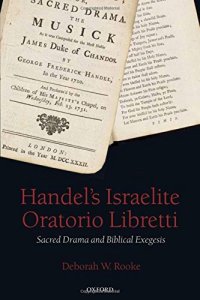
Ebook: Handel’s Israelite Oratorio Libretti: Sacred Drama and Biblical Exegesis
Author: Deborah W. Rooke
- Tags: Criticism & Interpretation, Exegesis & Hermeneutics, New Testament, Old Testament, Bible Study & Reference, History, Africa, Americas, Arctic & Antarctica, Asia, Australia & Oceania, Europe, Middle East, Russia, United States, World, Ancient Civilizations, Military, Historical Study & Educational Resources, Religion & Spirituality, Agnosticism, Atheism, Buddhism, Hinduism, Islam, Judaism, Literature & Fiction, New Age & Spirituality, Occult & Paranormal, Other Eastern Religions & Sacred Texts, Other Religions Practices & Sa
- Year: 2012
- Publisher: Oxford University Press
- Edition: 1
- Language: English
- pdf
Handel's Israelite oratorios are today little known among non-specialists, but in their own day they were unique, pioneering and extremely popular. Dating from the period 1732-1752, they combine the musical conventions of Italian opera with dramatic plots in English that are adaptations of Old Testament narratives. They constitute a form of biblical interpretation, but to date, there has been no thoroughgoing study of the theological ideas or the attitudes towards the biblical text that might be conveyed in the oratorios' libretti. This book aims to fill that gap from an interdisciplinary perspective.
Combining the insights of present-day biblical studies with those of Handelian studies, Deborah W. Rooke examines the libretti of ten oratorios - Esther, Deborah, Athalia, Saul, Samson, Joseph and his Brethren, Judas Macchabaeus, Solomon, Susanna and Jephtha - and evaluates the relationship between each libretto and the biblical story on which it is based. Rooke comments on each biblical text from a modern scholarly perspective, and then compares the modern interpretation with the version of the biblical narrative that appears in the relevant libretto. Where the libretto is based on a prior dramatic or literary adaptation of the biblical narrative, she also discusses the prior adaptation and how it relates to both the biblical text and the corresponding oratorio libretto. In this way the distinctive nuances of the oratorio libretti are highlighted, and each libretto is then analysed and interpreted in the light of eighteenth-century religion, scholarship, culture and politics. The result is a fascinating exploration not only of the oratorio libretti but also of how culture and context determines the nature of biblical interpretation.
Combining the insights of present-day biblical studies with those of Handelian studies, Deborah W. Rooke examines the libretti of ten oratorios - Esther, Deborah, Athalia, Saul, Samson, Joseph and his Brethren, Judas Macchabaeus, Solomon, Susanna and Jephtha - and evaluates the relationship between each libretto and the biblical story on which it is based. Rooke comments on each biblical text from a modern scholarly perspective, and then compares the modern interpretation with the version of the biblical narrative that appears in the relevant libretto. Where the libretto is based on a prior dramatic or literary adaptation of the biblical narrative, she also discusses the prior adaptation and how it relates to both the biblical text and the corresponding oratorio libretto. In this way the distinctive nuances of the oratorio libretti are highlighted, and each libretto is then analysed and interpreted in the light of eighteenth-century religion, scholarship, culture and politics. The result is a fascinating exploration not only of the oratorio libretti but also of how culture and context determines the nature of biblical interpretation.
Download the book Handel’s Israelite Oratorio Libretti: Sacred Drama and Biblical Exegesis for free or read online
Continue reading on any device:

Last viewed books
Related books
{related-news}
Comments (0)